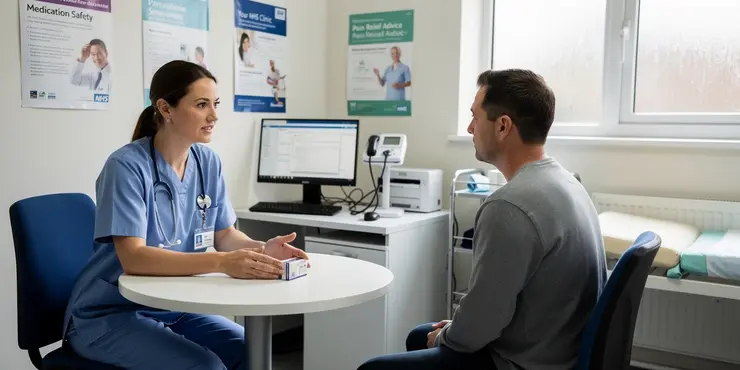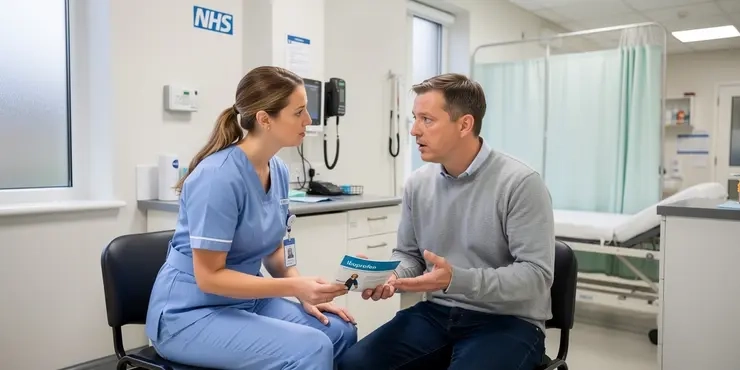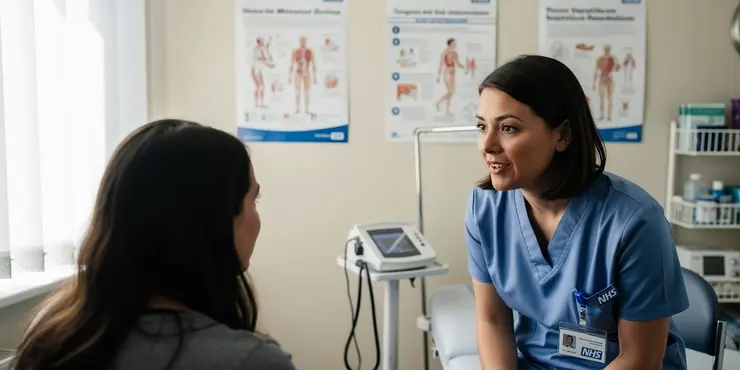Find Help
More Items From Ergsy search
-

Can I take ibuprofen and paracetamol together? - Common Health Questions | NHS
Relevance: 100%
-

Is it safe to take Paracetamol with Ibuprofen?
Relevance: 77%
-

Which one is better for toothache: Ibuprofen or Paracetamol?
Relevance: 73%
-
What is the difference between aspirin, paracetamol, and ibuprofen?
Relevance: 73%
-

What is the difference between Aspirin, Paracetamol, and Ibuprofen?
Relevance: 72%
-

What is a common use of paracetamol?
Relevance: 62%
-

What is Paracetamol?
Relevance: 56%
-

Does Paracetamol reduce inflammation?
Relevance: 53%
-

What is Paracetamol?
Relevance: 52%
-

Common health questions about chickenpox | NHS
Relevance: 48%
-

What is Ibuprofen?
Relevance: 46%
-

What are the side effects of Ibuprofen?
Relevance: 44%
-

Are Aspirin and Ibuprofen the same?
Relevance: 44%
-

Is Paracetamol the same as Aspirin?
Relevance: 42%
-

Is paracetamol linked to autism?
Relevance: 42%
-

Can I use Ibuprofen for menstrual pain?
Relevance: 41%
-

Can Ibuprofen be used to reduce inflammation?
Relevance: 40%
-

Can I take Aspirin and Ibuprofen together?
Relevance: 40%
-

Why might someone choose Paracetamol over NSAIDs?
Relevance: 39%
-

What are the side effects of Paracetamol?
Relevance: 39%
-

What should pregnant individuals consider when taking paracetamol?
Relevance: 38%
-

Why is there concern about paracetamol and autism?
Relevance: 37%
-

Can Paracetamol be used in pregnant women?
Relevance: 37%
-

Is there any scientific evidence that links paracetamol use to autism?
Relevance: 37%
-

The Delirium Question on Patientrack
Relevance: 36%
-

Which one is better for headaches: Aspirin or Paracetamol?
Relevance: 36%
-

Is there any risk of using paracetamol outside of pregnancy with regard to autism?
Relevance: 36%
-

GP Nursing Most Common Medications UK.
Relevance: 32%
-

How to Treat a Common Cold
Relevance: 29%
-

Dealing with Common Childhood Illnesses
Relevance: 29%
-

How many questions are there in the DVSA Theory Test?
Relevance: 29%
-

What can cause autism, if not paracetamol?
Relevance: 28%
-

What should customers do if they have further questions about refunds?
Relevance: 27%
-
Have any major health organizations advised against using paracetamol during pregnancy due to autism concerns?
Relevance: 26%
-

How prevalent is the use of paracetamol during pregnancy?
Relevance: 26%
-

Advice if your child has... A High temperature
Relevance: 25%
-

Caring for a child with fever | NHS
Relevance: 25%
-

Which medication should be avoided for children with fevers?
Relevance: 24%
-

What are the limitations of studies examining paracetamol use and autism?
Relevance: 24%
-

Top 5 questions about having a general anaesthetic
Relevance: 24%
Can I Take Ibuprofen and Paracetamol Together? - Common Health Questions | NHS
Introduction
Combining medications can often be a cause for concern, and it is important to understand the implications and guidelines surrounding their use. In the United Kingdom, the NHS (National Health Service) provides valuable guidance on whether it is safe to take ibuprofen and paracetamol together.
Understanding Ibuprofen and Paracetamol
Ibuprofen is a nonsteroidal anti-inflammatory drug (NSAID) that helps reduce inflammation, pain, and fever. It is commonly used for conditions such as arthritis, menstrual pain, and other minor aches. Paracetamol, also known as acetaminophen, is a widely used pain reliever and fever reducer. It is often utilised to treat headaches, muscle aches, toothaches, and fevers.
Safety of Taking Ibuprofen and Paracetamol Together
According to the NHS, it is generally safe to take both ibuprofen and paracetamol together. The two medications work in different ways and do not interact negatively, allowing them to be used simultaneously for enhanced pain relief. However, it is essential to adhere to the dosage instructions provided on the packaging or by a healthcare professional.
Recommended Dosages
The standard adult dose for ibuprofen is typically 200-400 mg, taken every 4-6 hours as required, with a maximum of 1,200 mg per day unless otherwise advised by a doctor. For paracetamol, the usual adult dose is 500-1,000 mg every 4-6 hours, with a maximum of 4,000 mg per day. Always ensure that you do not exceed these recommended limits to avoid adverse effects.
Considerations and Precautions
Although taking both medications together is generally safe, certain individuals may need to exercise caution. People with underlying health conditions such as liver or kidney disease, gastrointestinal issues, or those who are pregnant or breastfeeding should consult a healthcare professional before combining these medications. Additionally, it is crucial to avoid alcohol consumption when taking these drugs as it can exacerbate potential side effects.
Conclusion
In summary, the NHS confirms that taking ibuprofen and paracetamol together is generally safe when following the recommended dosages. This combination can provide effective pain and fever relief for various conditions. However, it is always advisable to seek personal medical advice if you have any health concerns or are on other medications. Staying informed and cautious ensures you utilise these pain relief options effectively and safely.
Can I Take Ibuprofen and Paracetamol Together? - Common Health Questions | NHS
Introduction
Sometimes, people need to take more than one medicine. It is important to know if it's safe. In the UK, the NHS (National Health Service) helps us know if we can take ibuprofen and paracetamol together safely.
Understanding Ibuprofen and Paracetamol
Ibuprofen is a medicine that helps reduce swelling, pain, and fever. People use it for things like arthritis, period pain, and small aches. Paracetamol, also called acetaminophen, is another medicine for pain and fever. It helps with headaches, muscle pain, toothaches, and fever.
Safety of Taking Ibuprofen and Paracetamol Together
The NHS says it's usually safe to take both ibuprofen and paracetamol at the same time. They work differently and don't cause problems together. This means they can help with pain better when used together. But remember, always follow the instructions on the package or from a doctor about how much to take.
Recommended Dosages
Adults usually take 200-400 mg of ibuprofen every 4-6 hours, with a limit of 1,200 mg a day, unless the doctor says otherwise. For paracetamol, adults take 500-1,000 mg every 4-6 hours, with a limit of 4,000 mg a day. Never take more than this to avoid getting sick.
Considerations and Precautions
While taking both medicines is mostly safe, some people need to be careful. If you have health problems like liver or kidney disease, stomach issues, or are pregnant or breastfeeding, ask a doctor before taking both. Also, do not drink alcohol when taking these medicines because it can make side effects worse.
Conclusion
In short, the NHS says taking ibuprofen and paracetamol together is usually safe if you follow the instructions. They can help with pain and fever for many problems. But always ask a doctor if you have health questions or take other medicines. Being careful helps you use these medicines safely and well.
Frequently Asked Questions
Can I take ibuprofen and paracetamol together?
Yes, ibuprofen and paracetamol can be taken together. They work differently and can be used in combination to help reduce pain and inflammation.
How often can I take ibuprofen and paracetamol together?
You can take them together up to four times a day. However, you should ensure that you follow the dosing instructions on the packaging or as advised by your healthcare provider.
What are the benefits of taking ibuprofen and paracetamol together?
Taking ibuprofen and paracetamol together can provide more effective pain relief compared to taking just one type of medicine. This is because they tackle pain in different ways.
Are there any risks in taking ibuprofen and paracetamol together?
While it is generally safe, it's important to follow the recommended doses to avoid side effects. If you have any health conditions or are taking other medications, consult your doctor first.
Can children take ibuprofen and paracetamol together?
Yes, children can take ibuprofen and paracetamol together. However, dosing should be appropriate for their age and weight, and it is important to follow the guidance provided by a healthcare professional.
How much ibuprofen can I take in a day?
The maximum recommended daily dose for an adult is 1,200mg to 1,800mg (three to four doses of 400mg), unless your doctor prescribes a different dose.
How much paracetamol can I take in a day?
The maximum recommended daily dose for an adult is 4,000mg (eight 500mg tablets), taken at least four hours apart.
Can I take ibuprofen if I have asthma?
If you have asthma, you should consult a healthcare professional before taking ibuprofen as it can sometimes make asthma symptoms worse.
Can I take ibuprofen and paracetamol on an empty stomach?
Paracetamol can be taken with or without food. However, ibuprofen is best taken with food or milk to reduce the risk of stomach irritation.
Can I take ibuprofen and paracetamol if I am pregnant?
Paracetamol is generally considered safe during pregnancy if taken as directed. However, ibuprofen should be avoided, especially in the third trimester. Always consult your healthcare provider before taking any medication while pregnant.
What should I do if I accidentally take too much ibuprofen or paracetamol?
If you accidentally take too much ibuprofen or paracetamol, seek medical advice immediately, even if you feel well. An overdose can cause serious harm.
Can I drink alcohol while taking ibuprofen and paracetamol?
It's best to avoid alcohol while taking these medications, as it can increase the risk of side effects, particularly stomach issues with ibuprofen and liver damage with paracetamol.
Can I take ibuprofen for long-term pain management?
Ibuprofen is generally used for short-term pain relief. Long-term use should be under the supervision of a healthcare provider because of potential risks, including gastrointestinal issues and cardiovascular problems.
Is it safe to take ibuprofen and paracetamol with other medications?
You should always check with your healthcare provider or pharmacist before taking ibuprofen and paracetamol with other medications to avoid potential interactions.
What should I do if I miss a dose of ibuprofen or paracetamol?
If you miss a dose, take it as soon as you remember. If it's almost time for your next dose, skip the missed dose and continue with your regular schedule. Do not double up doses to make up for a missed one.
Can I take ibuprofen and paracetamol at the same time?
Yes, you can take ibuprofen and paracetamol together. They work to help with pain and fever.
Here is how to take them safely:
- Check the box or talk to a doctor to know the right dose.
- Take the medicines with food or a drink.
- Use a timer to remind you when to take each medicine.
- Keep track of the times you take each medicine.
If you still feel unwell, or have questions, ask a doctor or pharmacist for help.
Yes, you can take ibuprofen and paracetamol at the same time. They help in different ways and can work together to reduce pain and swelling.
How often can I take ibuprofen and paracetamol together?
It's important to follow the doctor's advice.
You can usually take ibuprofen every 6 to 8 hours.
You can usually take paracetamol every 4 to 6 hours.
Do not take more than the amount on the medicine box.
Ask a doctor or pharmacist if you are not sure.
A medicine box and timer can help you remember when to take your medicine.
You can take them together up to four times a day. Make sure you read the instructions on the package or listen to what your doctor tells you.
What are the good things about taking ibuprofen and paracetamol together?
Ibuprofen and paracetamol are medicines that help when you have pain or a fever. Sometimes, taking them together can work better than just one. Before you do this, ask an adult or a doctor to help you decide if it's okay for you. Using a timer to remember when to take them can be helpful too!
Taking ibuprofen and paracetamol together can help with pain better than taking just one. This is because they work on pain in different ways.
Is it safe to take ibuprofen and paracetamol together?
Taking both ibuprofen and paracetamol at the same time can help with pain and fever.
But it is important to be careful and talk to an adult or a doctor before you do.
Sometimes, taking them together can upset your tummy. So, it's good to check first.
Here is what you can do:
- Ask a doctor or pharmacist if it's okay for you.
- Follow the instructions on the box.
- Use a pill organiser or timer to help you remember when to take them.
It's usually safe, but you should follow the rules about how much to take. This helps you not get sick. If you have health problems or take other medicine, talk to your doctor first.
Can kids take ibuprofen and paracetamol at the same time?
Can kids take ibuprofen and paracetamol at the same time?
Yes, kids can take ibuprofen and paracetamol together. But, you must give them the right amount for their age and weight. It's really important to follow what the doctor or nurse says.
How much ibuprofen can I take in one day?
Ibuprofen is a medicine that helps with pain and swelling.
It is very important to take the right amount.
If you are not sure, ask a doctor or a grown-up for help.
You can use a medicine spoon or cup to measure it.
Never take more than what the doctor or the label says.
If you still feel bad after taking it, tell a grown-up or doctor.
An adult should not take more than 1,200mg to 1,800mg in one day. This means you can take 3 or 4 doses of 400mg. Your doctor might give you a different amount.
How much paracetamol can I take in one day?
Paracetamol is medicine that helps when you have pain or a fever.
Here is how much you can take:
- Adults can take up to 8 tablets a day. Each tablet is 500mg. That is 2 tablets at once, up to 4 times a day.
- Children need less. Check with a doctor or pharmacist to find out how much.
Remember:
- Do not take more than 8 tablets in 24 hours.
- Wait at least 4 hours before you take more tablets.
Get help if you are not sure. You can ask a doctor or a pharmacist. They can help you understand how much to take.
Adults should not take more than 8 tablets each day. Each tablet is 500mg. Take the tablets at least 4 hours apart.
Can I take ibuprofen if I have asthma?
Ibuprofen is a medicine that helps with pain and fever. It is important to be careful with ibuprofen if you have asthma.
Sometimes, people with asthma can have breathing problems when they take ibuprofen. It is a good idea to ask your doctor before taking ibuprofen.
If you have asthma and need medicine, talk to a healthcare worker. They can tell you what is safe to take.
If you have asthma, talk to a doctor before taking ibuprofen. Ibuprofen can sometimes make asthma worse.
Can I take ibuprofen and paracetamol without food?
It is important to know how to take medicine safely.
Here are some tips:
- Ibuprofen can upset your tummy if you don't eat first. Try to have a snack or a meal before taking it.
- Paracetamol is usually okay to take with or without food, but it can still be a good idea to eat something.
- If you are not sure, ask a grown-up or a doctor.
Using these tips can help your tummy feel better.
You can take paracetamol with food or without food. But it's better to take ibuprofen with food or milk. This helps stop it from hurting your stomach.
Can I take ibuprofen and paracetamol if I am pregnant?
If you are going to have a baby, talk to your doctor before taking medicine. This includes ibuprofen and paracetamol.
Your doctor will help you know what is safe for you and the baby. They can give good advice.
If it is hard to remember what the doctor says, ask them to write it down. You can also take a friend or family member with you to help listen.
There are phone apps that can remind you about medicine. Use pictures and colors to help you understand the medicine labels.
Paracetamol is usually safe to take when you are pregnant, but only if you follow the instructions. Do not take ibuprofen, especially if you are in the last 3 months of pregnancy. Always talk to your doctor before taking any medicine when you are pregnant.
What should I do if I take too much ibuprofen or paracetamol?
If you take more ibuprofen or paracetamol than you should, tell an adult right away. You can also call a doctor. They will know how to help you.
Ask someone to stay with you and use the phone to call for help. You can also use the internet to find your local emergency number.
Make sure to tell the helpers how much medicine you took and when you took it.
If you take too much ibuprofen or paracetamol by accident, talk to a doctor right away, even if you feel okay. Taking too much medicine can be very dangerous.
Can I drink alcohol when I take ibuprofen and paracetamol?
It is not safe to drink alcohol when you take medicine like ibuprofen and paracetamol.
Drinking alcohol and taking these medicines can hurt your stomach or liver.
Use a calendar or set a reminder on your phone to help you remember when to take your medicine and not drink alcohol.
Do not drink alcohol when you take these medicines. It can make side effects worse. With ibuprofen, it can hurt your stomach. With paracetamol, it can hurt your liver.
Can I take ibuprofen for a long time to help with pain?
Ibuprofen can help with pain when you hurt yourself. But you should talk to a doctor before using it for a long time. They can help you know if it's safe for you.
If you have pain for a long time, there are other ways to help, like:
- Talking to your doctor about other medicines.
- Trying gentle exercises to feel better.
- Using heat or cold packs.
- Trying relaxation techniques, like deep breathing.
Always ask a grown-up or doctor if you're not sure what to do.
Ibuprofen is medicine that helps with pain for a short time. If you need to take it for a long time, a doctor should check on you. This is because it can cause problems like tummy aches and affect your heart.
Can you take ibuprofen and paracetamol with other medicines?
Before you take ibuprofen and paracetamol with other medicines, ask your doctor or pharmacist first. This helps to make sure they will not cause problems when taken together.
What to Do If You Forget to Take Your Medicine
If you forget to take your ibuprofen or paracetamol, don't worry. Here’s what you can do:
- Take the missed dose as soon as you remember.
- If it's almost time for your next dose, skip the missed dose. Don't take two doses at once.
- If you are unsure, ask a grown-up or a doctor for help.
Here are some tools to help you remember your medicine:
- Set an alarm or reminder on your phone.
- Use a pill box with days of the week.
If you forget to take your medicine, take it as soon as you remember. But if it's nearly time for your next medicine, just wait and take it then. Do not take two doses at the same time to catch up.
If you find it hard to remember to take your medicine, ask someone you trust to remind you or use an alarm clock. You can also use a special pill box that helps you remember when to take your medicine.
Useful Links
This website offers general information and is not a substitute for professional advice.
Always seek guidance from qualified professionals.
If you have any medical concerns or need urgent help, contact a healthcare professional or emergency services immediately.
Some of this content was generated with AI assistance. We’ve done our best to keep it accurate, helpful, and human-friendly.
- Ergsy carfully checks the information in the videos we provide here.
- Videos shown by Youtube after a video has completed, have NOT been reviewed by ERGSY.
- To view, click the arrow in centre of video.
- Most of the videos you find here will have subtitles and/or closed captions available.
- You may need to turn these on, and choose your preferred language.
- Go to the video you'd like to watch.
- If closed captions (CC) are available, settings will be visible on the bottom right of the video player.
- To turn on Captions, click settings .
- To turn off Captions, click settings again.
More Items From Ergsy search
-

Can I take ibuprofen and paracetamol together? - Common Health Questions | NHS
Relevance: 100%
-

Is it safe to take Paracetamol with Ibuprofen?
Relevance: 77%
-

Which one is better for toothache: Ibuprofen or Paracetamol?
Relevance: 73%
-
What is the difference between aspirin, paracetamol, and ibuprofen?
Relevance: 73%
-

What is the difference between Aspirin, Paracetamol, and Ibuprofen?
Relevance: 72%
-

What is a common use of paracetamol?
Relevance: 62%
-

What is Paracetamol?
Relevance: 56%
-

Does Paracetamol reduce inflammation?
Relevance: 53%
-

What is Paracetamol?
Relevance: 52%
-

Common health questions about chickenpox | NHS
Relevance: 48%
-

What is Ibuprofen?
Relevance: 46%
-

What are the side effects of Ibuprofen?
Relevance: 44%
-

Are Aspirin and Ibuprofen the same?
Relevance: 44%
-

Is Paracetamol the same as Aspirin?
Relevance: 42%
-

Is paracetamol linked to autism?
Relevance: 42%
-

Can I use Ibuprofen for menstrual pain?
Relevance: 41%
-

Can Ibuprofen be used to reduce inflammation?
Relevance: 40%
-

Can I take Aspirin and Ibuprofen together?
Relevance: 40%
-

Why might someone choose Paracetamol over NSAIDs?
Relevance: 39%
-

What are the side effects of Paracetamol?
Relevance: 39%
-

What should pregnant individuals consider when taking paracetamol?
Relevance: 38%
-

Why is there concern about paracetamol and autism?
Relevance: 37%
-

Can Paracetamol be used in pregnant women?
Relevance: 37%
-

Is there any scientific evidence that links paracetamol use to autism?
Relevance: 37%
-

The Delirium Question on Patientrack
Relevance: 36%
-

Which one is better for headaches: Aspirin or Paracetamol?
Relevance: 36%
-

Is there any risk of using paracetamol outside of pregnancy with regard to autism?
Relevance: 36%
-

GP Nursing Most Common Medications UK.
Relevance: 32%
-

How to Treat a Common Cold
Relevance: 29%
-

Dealing with Common Childhood Illnesses
Relevance: 29%
-

How many questions are there in the DVSA Theory Test?
Relevance: 29%
-

What can cause autism, if not paracetamol?
Relevance: 28%
-

What should customers do if they have further questions about refunds?
Relevance: 27%
-
Have any major health organizations advised against using paracetamol during pregnancy due to autism concerns?
Relevance: 26%
-

How prevalent is the use of paracetamol during pregnancy?
Relevance: 26%
-

Advice if your child has... A High temperature
Relevance: 25%
-

Caring for a child with fever | NHS
Relevance: 25%
-

Which medication should be avoided for children with fevers?
Relevance: 24%
-

What are the limitations of studies examining paracetamol use and autism?
Relevance: 24%
-

Top 5 questions about having a general anaesthetic
Relevance: 24%


